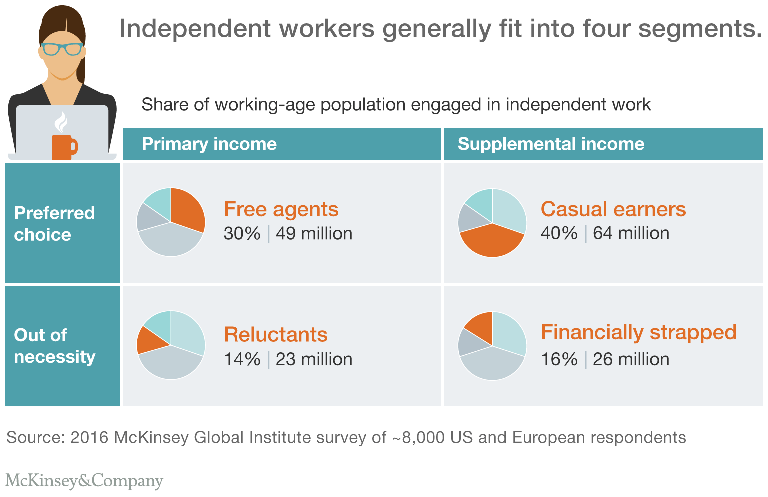Independent Work: Choice, Necessity, and the Gig Economy
CAPITALISM, 31 Oct 2016
October 2016 – The McKinsey Global Institute examines all the ways people are earning income, as well as the challenges independent work presents.
Working nine to five for a single employer bears little resemblance to the way a substantial share of the workforce makes a living today. Millions of people assemble various income streams and work independently, rather than in structured payroll jobs. This is hardly a new phenomenon, yet it has never been well measured in official statistics—and the resulting data gaps prevent a clear view of a large share of labor-market activity.
To better understand the independent workforce and what motivates the people who participate in it, the McKinsey Global Institute surveyed some 8,000 respondents across Europe and the United States. We asked about their income in the past 12 months—encompassing primary work, as well as any other income-generating activities—and about their professional satisfaction and aspirations for work in the future.
The resulting report, Independent work: Choice, necessity, and the gig economy, finds that up to 162 million people in Europe and the United States—or 20 to 30 percent of the working-age population—engage in some form of independent work. While demographically diverse, independent workers largely fit into four segments (exhibit): free agents, who actively choose independent work and derive their primary income from it; casual earners, who use independent work for supplemental income and do so by choice; reluctants, who make their primary living from independent work but would prefer traditional jobs; and the financially strapped, who do supplemental independent work out of necessity.
Those who do independent work by choice (free agents and casual earners) report greater satisfaction with their work lives than those who do it out of necessity (the reluctants and the financially strapped). This finding holds across countries, ages, income brackets, and education levels. Free agents reported higher levels of satisfaction in multiple dimensions of their work lives than those holding traditional jobs by choice, indicating that many people value the nonmonetary aspects of working on their own terms.
Independent work is rapidly evolving as digital platforms create large-scale, efficient marketplaces that facilitate direct and even real-time connections between the customers who need a service performed and the workers willing to provide that service. Today, just 15 percent of the independent workers we surveyed have used a digital platform to find work, but the so-called on-demand economy is growing rapidly.
While this digital transformation unfolds, several other forces could fuel growth in the independent workforce: the stated aspirations of traditional workers who wish to become independent, the large unemployed and inactive populations who want to work, and the increased demand for independent services from both consumers and organizations.
The growing prevalence of independent work could have tangible economic benefits, such as raising labor-force participation, providing opportunities for the unemployed, or even boosting productivity. Consumers and organizations could benefit from the greater availability of services and improved matching that better fulfills their needs. Digital platforms can amplify all these benefits through their larger scale, faster matches, seamless coordination, and richer information signals, enabling trust.
Yet some key challenges still must be addressed for this shift to be a feasible and satisfying development for workers. Issues such as benefits, income-security measures, and training and credentials offer room for policy makers, as well as innovators and new intermediaries, to provide solutions. Independent workers and traditional jobholders alike will have to become more proactive about managing their careers as digital technologies continue to reshape the world of work.
_______________________________________
James Manyika and Jacques Bughin are directors of the McKinsey Global Institute, where Susan Lund is a partner and Jan Mischke is a senior fellow; Kelsey Robinson is an associate partner in McKinsey’s San Francisco office; and Deepa Mahajan is a consultant in the Silicon Valley office.
DISCLAIMER: The statements, views and opinions expressed in pieces republished here are solely those of the authors and do not necessarily represent those of TMS. In accordance with title 17 U.S.C. section 107, this material is distributed without profit to those who have expressed a prior interest in receiving the included information for research and educational purposes. TMS has no affiliation whatsoever with the originator of this article nor is TMS endorsed or sponsored by the originator. “GO TO ORIGINAL” links are provided as a convenience to our readers and allow for verification of authenticity. However, as originating pages are often updated by their originating host sites, the versions posted may not match the versions our readers view when clicking the “GO TO ORIGINAL” links. This site contains copyrighted material the use of which has not always been specifically authorized by the copyright owner. We are making such material available in our efforts to advance understanding of environmental, political, human rights, economic, democracy, scientific, and social justice issues, etc. We believe this constitutes a ‘fair use’ of any such copyrighted material as provided for in section 107 of the US Copyright Law. In accordance with Title 17 U.S.C. Section 107, the material on this site is distributed without profit to those who have expressed a prior interest in receiving the included information for research and educational purposes. For more information go to: http://www.law.cornell.edu/uscode/17/107.shtml. If you wish to use copyrighted material from this site for purposes of your own that go beyond ‘fair use’, you must obtain permission from the copyright owner.

